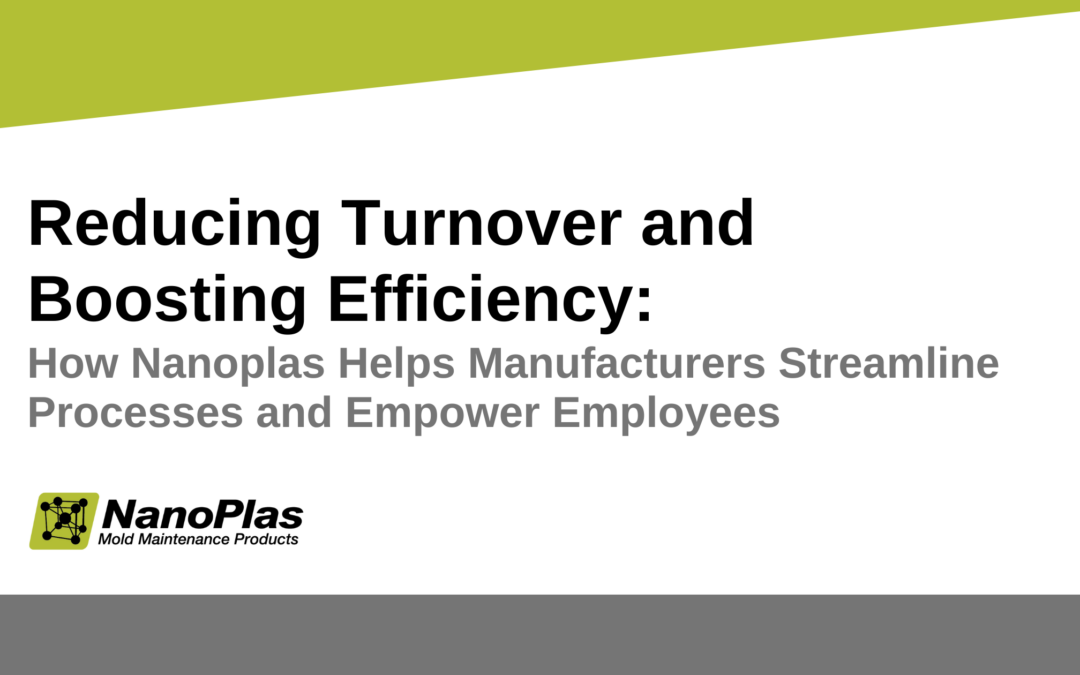
by Nanomold Coating | Jun 5, 2023 | Recent Posts |
They say, ‘the devil is in the details,’ and nowhere is this more evident than in manufacturing operations. Minor aspects can significantly impact efficiency and, by extension, the bottom line. This principle holds true for all industries, especially plastic injection molding, where even minor improvements can yield significant benefits.
As a leading manufacturer of plastic injection molding coatings, greases, cleaners/degreasers, rust preventatives, mold releases, and stain removers, Nanoplas is helping redefine the landscape of injection molding. By turning attention to the fine details that often go unnoticed, Nanoplas optimizes the production line’s operational efficiency.
A More Efficient Injection Molding Process
In a typical injection molding operation, you could deal with six or more distinct types of mold maintenance products, each with its specific role. Juggling various products can lead to increased complexity, inventory management challenges, storage needs, waste generation, and costs. On top of this, there’s the need to ensure that training and safety measures are in place for handling each product.
Here’s the real game changer: Nanoplas products are designed for multitasking. Instead of a lineup of products for each application, you only need to lean on a couple of Nanoplas’ versatile mold maintenance solutions. This transition leads to a streamlined process marked by less clutter, reduced confusion, and ramped-up efficiency. Nanoplas injection molding products deliver:
- Simplicity: The fewer products you use, the easier it is to manage the overall process. This reduces complexity, making training and everyday operations more straightforward.
- Reduced Waste: Using multipurpose products reduces waste produced by excess packaging and unused or expired materials.
- Cost Savings: Fewer products often mean less money spent on purchasing, stocking, and replacing individual items.
- Space Savings: Reducing the number of products needed means you’ll require less storage space, freeing up room for other operations or creating a less cluttered working environment.
- Improved Efficiency: With fewer products to handle, switch between, and maintain, process efficiency can be significantly improved. This could lead to higher productivity and better quality control.
- Consistency: Using fewer products from a single manufacturer like Nanoplas ensures better compatibility and consistency across the process, reducing the risk of unforeseen reactions or complications.
- Increased Production Uptimes: You can significantly increase production uptimes by reducing the number of products used in the injection molding process. Traditional processes might require regular pauses for maintenance, such as re-greasing machine parts or dealing with failing molds, which can lead to considerable downtime and disrupt production schedules.
Empowering Your Employees
It becomes much easier to train employees when processes are simplified using versatile, multifunctional products like those from Nanoplas. They can focus on learning the core aspects of the process without getting bogged down in managing a vast array of mold maintenance products. Plus, a simpler, more streamlined process means fewer chances for confusion or mistakes, leading to a more positive work environment. Employees who feel confident and competent in their roles are less likely to seek employment elsewhere. So, not only does a simplified process make training a breeze, but it can also help reduce employee turnover, keeping your skilled workforce stable and reliable.
Streamlined Injection Molding Solutions
The streamlined injection molding process made possible by Nanoplas has far-reaching benefits that extend beyond the production line. It not only simplifies operations but also directly influences employee satisfaction. This satisfaction often translates into reduced employee turnover, keeping a stable and skilled workforce at the heart of your operations. And when your team is competent and content, they’re better equipped to maintain high levels of production efficiency. With Nanoplas, you’re not just investing in a solution to optimize your injection molding process but also fostering a happier and more productive workplace.
Experience the difference yourself. Try a free Nanoplas product sample today!
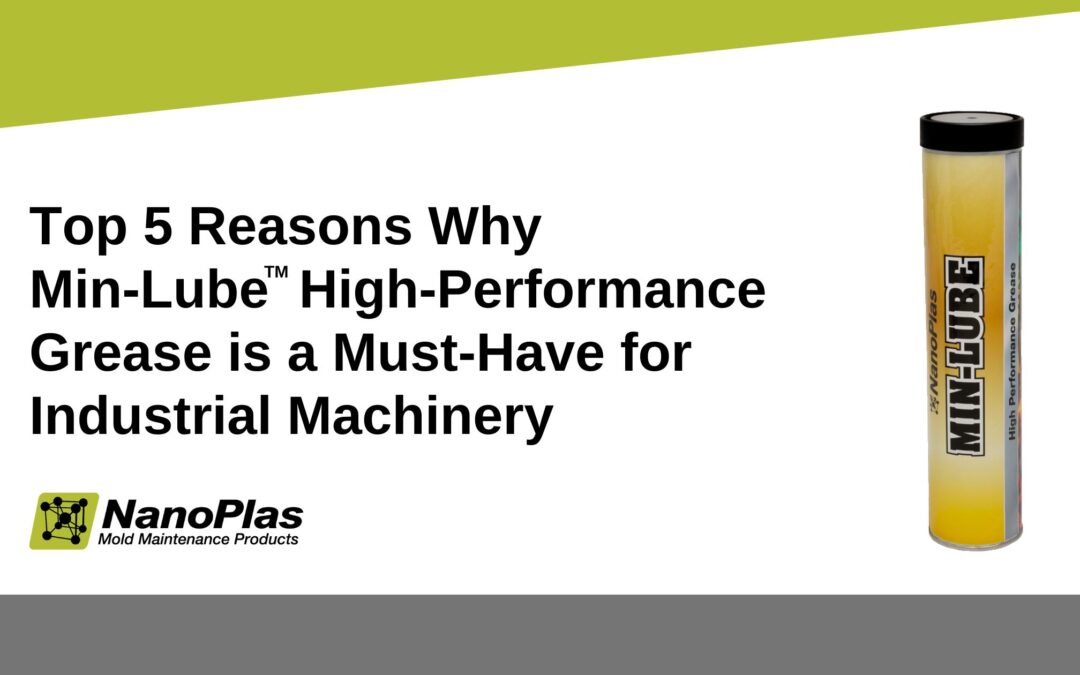
by Nanomold Coating | Apr 24, 2023 | Recent Posts |
Industrial machinery requires high-performance lubrication to operate efficiently, effectively, and safely. Min-Lube High-Performance Grease is an excellent choice for injection molding, offering exceptional protection and performance in severe environments and food and pharmaceutical-related industries. Let’s explore why Min-Lube High-Performance Grease from NanoPlas is a must-have for industrial machinery in the injection molding industry.
- Extreme Pressure and Wear Protection
The equipment and machinery involved in the Injection molding process are subjected to high levels of pressure and stress, which can result in wear and tear over time. This can cause the machinery to break down or malfunction, leading to costly repairs and downtime.
Min-Lube grease provides superior protection against extreme pressure and wear, ensuring that machinery operates efficiently and effectively for an extended period. This helps reduce equipment downtime, increase productivity, and reduce maintenance costs. The proprietary calcium sulfonate complex and carefully selected additive package offer excellent thermal, oxidative, and mechanical stability, making it ideal for severe environments.
- Wide Temperature Range
Injection molding machinery may be subjected to high temperatures due to plastic melting and low temperatures when the molded parts are cooled. Using grease that can withstand these extreme temperatures is critical to ensuring that the machinery operates efficiently and effectively, even under these extreme conditions. Additionally, grease with a wide temperature range can help reduce maintenance costs associated with switching lubricants due to temperature changes.
Min-Lube grease is designed to work effectively in a wide temperature range, making it suitable for various industrial applications. It remains stable at temperatures ranging from -15 °F to 550 °F, providing excellent protection and performance under high and low-temperature conditions, ensuring the machine can operate reliably throughout the entire injection molding process.
- Resistance to Water, Steam, Acid, and Chemicals
The injection molding process often involves using materials and substances that can cause corrosion, rust, and other forms of degradation to machinery and equipment. Using grease resistant to these substances can help ensure your machinery remains protected and in good condition, even when exposed to harsh environments.
Min-Lube grease is highly resistant to water, steam, acid, and many chemicals, making it an ideal lubricant for machinery operating in harsh environments. In addition, it provides excellent rust protection, ensuring that machinery is protected from corrosion, even in the presence of water and chemicals.
- Antimicrobial Protection
Injection molding machinery often operates in environments where moisture and organic matter are present, which creates a breeding ground for microbes. This can contaminate the machine and potentially the end product. Microbes can also break down lubricants and cause them to lose their effectiveness over time. Antimicrobial protection can help prevent this breakdown, ensuring that the lubricant remains effective for longer.
It contains Micronox® to provide antimicrobial protection, which is a groundbreaking technology that prevents degradation of the lubricant. This makes it a more long-lasting and effective lubricant for industrial machinery.
- Suitable for Food and Pharmaceutical Industries
The machinery and equipment used in the food and pharmaceutical industry must meet strict regulations and guidelines for cleanliness, hygiene, and safety. Any contamination or impurities in the products can have severe consequences for public health, making it critical to ensure that all machinery and equipment involved in the production process meet these standards.
Min-Lube grease complies with NSF Nonfood Compound Category Code: H1 and is designed specifically for lubrication in food and pharmaceutical-related industries, making it an ideal lubricant for machinery used in these industries. It does not contain metals, PTFE, or silicone, making it a safer and more reliable option than other lubricants.
Min-Lube High-Performance Grease is a must-have for industrial machinery, specifically in the injection molding industry. Its superior protection against severe environments, compliance with food and pharmaceutical regulations, antimicrobial protection, wide temperature range, and increased equipment lifespan make it an excellent choice for all industrial applications. By investing in high-quality lubricants like Min-Lube High-Performance Grease, you can ensure that your machinery operates safely, efficiently, and effectively for years to come.
Order your free sample and experience the Min-Lube difference for yourself!
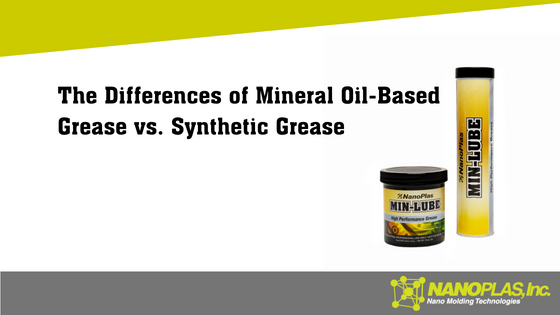
by Nanomold Coating | Nov 14, 2022 | Recent Posts |
As our new, highly acclaimed Min-Lube High Performance Grease enters into shops as the go-to grease for all applications, it’s a good time to talk about how a mineral oil-based grease compares to synthetic grease in general and then specifically how Min-Lube stands out. The main difference between a mineral oil-based and synthetic grease is obvious: mineral oil-based greases are natural and synthetic greases are, well, synthetic.
Benefits of Synthetic Grease
In a synthetic grease, because it’s man-made, the molecular structure is all the same. Because of that, there’s a very thin fluid film, which typically lowers the amount of friction. This is why synthetic greases do very well in high-speed applications and in managing heat.
That being said, what can be added to a full synthetic grease is limited. This is because all additives are hydrocarbons, which are natural. Synthetic oils are not natural, so not all additives are compatible with synthetic-based greases. This is also why synthetic greases are typically not all-purpose — their physical properties limit their ability to be so.
Benefits of Mineral Oil-Based Grease
Mineral oil-based greases, like Min-Lube, are natural. Because of this, it is exceptionally easy to add in hydrocarbon (i.e. natural) additives. Everything blends perfectly with no fallout and no need to emulsify. So we can make a mineral oil-based grease exactly what shops and our customers need it to be, which is what we did with Min-Lube.
Min-Lube Additives
Min-Lube was built to be the only grease most shops need. As injection molders use up their existing greases and look to re-order, they can look at Min-Lube, which is suitable for almost all applications.
The additive package focuses on thermal, oxidative, and mechanical stability, and features Micronox® for antimicrobial protection against degradation.
Simply put, Min-Lube is a complete product. It’s mechanically stable, nothing will fall out, nothing will separate, and it has an extraordinarily high temperature and pressure rating. With Min-Lube, facilities can keep one grease on hand rather than having to purchase and store multiple greases for specific purposes.
The Min-Lube data sheet proves its versatility across more tests than competitors can list. The only better proof is to try it for yourself. Request a free sample today.
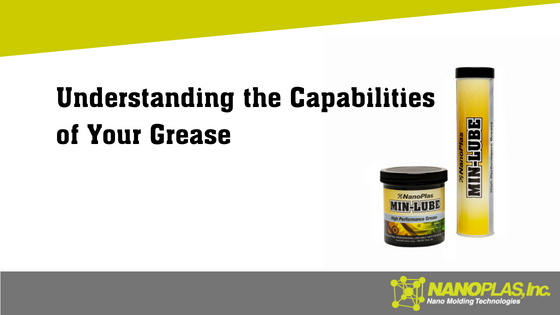
by Nanomold Coating | Nov 8, 2022 | Recent Posts |
The best way to understand the capabilities of the grease or greases you use is, of course, to use them. Depending on the application and the need, you may have several greases around the shop for multiple purposes, using one for high speeds and another for high temperatures or any other specialized use.
When manufacturers explain the capabilities of their greases, they’re generally talking about the additives. Starting from mineral oil-based or synthetic oil (the oil is the delivery vessel), a pressure additive will help with high-pressure applications, a temperature additive will be used for high-temperature applications, a detergent is added when cleaning is essential, etc. This is highly simplified and the list can go on and on, but the key takeaway is that greases can be very specialized in their design.
What’s In Your Grease
Like any product in any industry, greases will be marketed based on their strength(s) and how and where manufacturers intend them to be used. In other words, if a grease is a high-temperature grease, that’s all the manufacturer will talk about. The focus is on what it can do, but typically there’s no discussion or clear mention of what it can’t do. If that one thing is all your shop needs, that’s fine. But if you’re like most shops, your grease needs are multi-faceted, so you may be turning to several different greases to meet those varying needs. Or, you’re using a multi-purpose grease, but it’s not quite meeting expectations, and you haven’t figured out why. This is where looking at Product Data Sheets (PDSs) comes in handy.
Comparing Product Data Sheets
A product data sheet shows the grease’s purpose, capabilities, ideal applications, and how it performed on standardized tests. And here’s the secret on the PDS test results: no matter the product, no matter the manufacturer, the results are always going to be good. This is because manufacturers will only list the tests in which their products excel, just like they’ll only market the product based on the capabilities it excels at.
So a grease designed for high-temperature applications will list all the temperature tests in which it succeeds, but will omit test results for say, roll stability or rust, or whatever tests/capabilities don’t show good results.
So if your grease isn’t multi-tasking the way you’d like it to, or you’re using multiple greases in your shop, grab the product data sheets. And compare them to the PDS for Min-Lube.
Min-Lube All-Purpose Grease
On the first page, you’ll see Min-Lube has outstanding mechanical stability and is an all-purpose grease that can be the one and only grease you need in your shop for almost all applications. If that sounds like a hefty claim, move on to page two of the PDS. This is where we list all the tests we run on Min-Lube, including the results and test methods.
With Min-Lube, our list of test results is long because Min-Lube does so well in so many areas. It’s a true, all-purpose grease that can outperform competitor products. Our comprehensive additive package focuses on thermal, oxidative, and mechanical stability, which prevents fallout and keeps Min-Lube reliable in all applications while excellent in rust and corrosion prevention.
Like we said at the beginning, we recognize that using a grease is the best way to understand its true capabilities. Request a free sample of Min-Lube to see how versatile it can be for your shop.
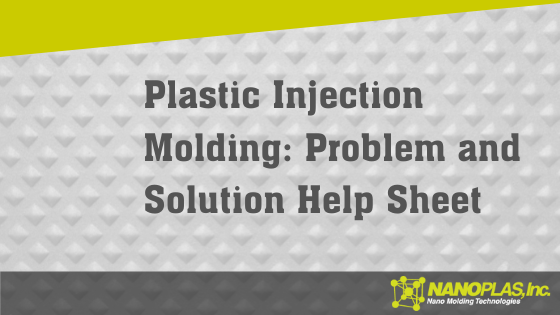
by Nanomold Coating | Mar 8, 2022 | Recent Posts |
As an injection molder, we know you face a myriad of issues day to day. Those issues are the inspiration for our products. In fact, the issues that injection molders constantly come up against drive the innovation and creation of our product line. Our job is to make your job easier, faster, and more efficient with products that actually work and truly solve problems.
In recognition of the need for efficiency, we’ve taken the most common injection molding issues and created a help sheet with probable causes and recommended solutions.
We also know you’d like something more concrete than “this works, just take our word for it.” So we’ve also included relevant case studies from fellow injection molders highlighting the related problems and the results they achieved with specific Nanoplas products.
Download the Nanoplas Help Sheet
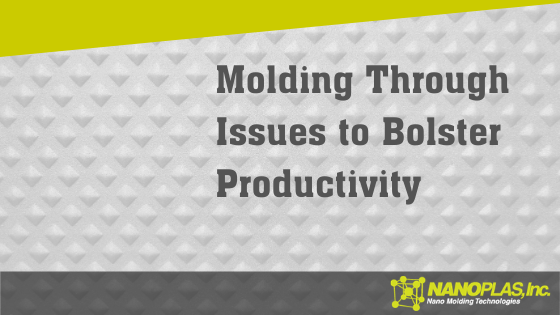
by Nanomold Coating | May 3, 2021 | Recent Posts |
Injection molding, like most of manufacturing, has been hit hard by the pandemic. Just about every injection molder is behind right now, and those same injection molders are running faster than ever before in an effort to catch up, which can mean trying to mold through issues rather than remove molds from the press. It’s more important than ever for injection molders to run efficiently with as little downtime as possible.
Issues Facing Injection Molders
While not unique to injection molding, the pandemic forced a dramatic change in the way companies have to operate. Supply shortages have left some injection molders without the materials they need to do their jobs. Facility shutdowns, even if temporary, put a halt to all productivity, which is hard to get back.
Staff shortages, either due to layoffs or employees voluntarily leaving (or employees who were laid off opting to find opportunities in other industries), put a lot more responsibility on those who remain and make it harder to hire or rehire employees. All these things can be immensely detrimental to productivity, so efficiency is at a premium.
Necessities of Running Fast
Just over a year ago, a mold that was defective or causing certain injection molding issues would often be taken off the press, either to be repaired or replaced. Now, that’s not happening as often. Injection molders simply don’t have the time to take molds off the press, so they find themselves molding through issues. This can help enhance efficiency and output for a while, but is not a sustainable solution as it leads to more defects.
Injection molders know this isn’t ideal, but lately, it’s been necessary to maximize production.
Coatings and Greases Reduce Downtime
As the injection molding industry plays catch up, there are some things injection molders can do to reduce potential defects. Using a Nanoplas coating like our HC™ Heat Cure or QC™ Quick Cure coatings will help parts release from the mold easier and with more consistency, allowing production to keep running as efficiently as possible without creating any additional issues like bleeding or sticking.
Nanoplas greases, like Syn-Lube and Cera-Lube protect against friction and wear, and help lines run efficiently with reduced defects, prolonging the life of the molds and increasing productivity.
What’s Next?
\In injection molding, everyone always wants to increase productivity and reduce downtime. That won’t change. Nanoplas coatings and greases will continue to help keep production lines running, whether trying to catch up to where the industry was or running at full capacity.
As more people return to work and as supplies become more abundant, we’ll start to see manufacturing get back to where it was. Until then, it’s going to remain hectic and companies will need to adapt as best they can to keep downtime low and productivity high.






